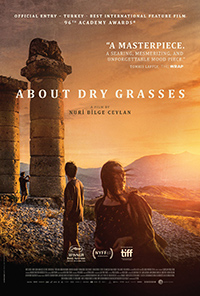To Sir, With Ego: Ceylan Waltzes with Narcissism in Captivating Character Study
 The filmography of Nuri Bilge Ceylan is characterized by complex examinations of human nature, stretched across scenarios which have only become more dense over the past two decades. His latest, About Dry Grasses, co-written by his regular collaborator (and wife) Ebru Ceylan and Akin Aksu (returning for script duty after first working on Ceylan’s 2018 title The Wild Pear Tree) showcases, once again, an unparalleled level of dialogue in modern cinema. Arguably less abstruse than some of his past works, this latest marathon focuses on a generally unfavorable protagonist, a manipulative narcissist whose behavior is both fascinating and repellant as it is understandable. An examination of unacknowledged hubris allowed to warp its environment when unchecked, a series of increasingly troubling power struggles catalyze this foray into underutilized academics whose dreams have been distilled.
The filmography of Nuri Bilge Ceylan is characterized by complex examinations of human nature, stretched across scenarios which have only become more dense over the past two decades. His latest, About Dry Grasses, co-written by his regular collaborator (and wife) Ebru Ceylan and Akin Aksu (returning for script duty after first working on Ceylan’s 2018 title The Wild Pear Tree) showcases, once again, an unparalleled level of dialogue in modern cinema. Arguably less abstruse than some of his past works, this latest marathon focuses on a generally unfavorable protagonist, a manipulative narcissist whose behavior is both fascinating and repellant as it is understandable. An examination of unacknowledged hubris allowed to warp its environment when unchecked, a series of increasingly troubling power struggles catalyze this foray into underutilized academics whose dreams have been distilled.
Stationed as an art teacher in the small town of Incesu, Samet (Deniz Celiloğlu) is bitter about the four years he’s wasted in an occupation he’s grown tired of. Having just returned from the holiday break, he’s looking forward to asking for a transfer to Istanbul after putting in the requisite time in this post. He clearly feels he’s better than his colleagues, even his housemate Kenan (Musab Ekici), though the two of them seem painfully unaware of their vague competition with each other. When Samet’s prized student from his 5th grade class, Sevim (Ece Bagci), betrays their secretive friendship by making a complaint about his behavior, Samet’s barely contained disdain for his surroundings bubbles up. As part of the aftershocks from this incident, he decides to sabotage Kenan’s developing relationship with Nuray (Merve Dizdar), a teacher from a bigger school in a nearby town.
A knockout performance from Deniz Celiloğlu as Samet recalls a variety of 1970s era performances from Jack Nicholson, captivating yet sinister, left to sharpen his talons on the meager targets in his small orbit. Initially, we’re unsure about how empathetically debased Samet has become, clearly miserable in his small town post. Only those who satisfy a certain need for his recognition amuse him, leading to a lack of boundaries which cause his unraveling. How Ceylan psychologizes him makes perfect sense one we’re led to understand what kind of a man he is and how he views his place in the environment.
Clearly, his heart isn’t in teaching, if it ever was, more focused on his own pursuits as an amateur photographer, his way to control his own frame. He doubles down on this by forcing his students to draw his own photographs in their lessons. But Samet is, like the title suggests, a dried out fire hazard who ignites at the first spark of opposition. Ceylan playfully and quite drastically breaks form in one scene, perhaps also a nod to this sentiment of Samet’s, a character not even the narrative can rightly control.
As his punishment of Sevim’s betrayal fizzles out, Samet subconsciously seeks a replacement for his need to conquer. Nuray becomes an unfortunate target in the crossfire, initially a wounded bird he saw fit to present to his colleague and house mate Kenan, who he clearly thinks he’s superior to. Nuray is an easy target, so they both think, having lost her leg in a terrorist attack recently. But when he suspects Kenan as trying to court Sevim’s attentions, Samet routinely thwarts the budding romance he himself had planted the seeds of. It’s here, when Nuray takes the reins by directly confronting both men in their passive aggressive behavior with one another where About Dry Grasses takes on a poetic perfection.
If Celiloglu is reminiscent of Nicholson, Merve Dizdar has the haunted quality of early Barbara Steele. There’s an added density regarding another lost soul Samet has befriended, a young man unable to break free from the familial restraints which bind him, representing the diminished empathetic afterthoughts suggesting he was once a different kind of person. But alienation and disappointment have turned him into something else.
Ceylan employs two new cinematographers for his latest, Cevahir Sahin and Kursat Uresin, capturing a gloomy, mostly wintry world all these diminished, unhappy characters are caught up within. It’s only in the final bit of Samet’s narration where the exact essence of the title comes about, referencing how perspective allows for something to be categorized as insignificant, framed in relation to the only two real seasons experienced in the area. In a world defined by binaries, where the environment is either lush or frozen, it’s easy to retreat inside oneself and interpret the world as limited. To quote from some of the script’s fine prose, “the truth is as brutal as it is boring.” Fortunately, Ceylan’s About Dry Grasses is anything but.
Reviewed on May 19th at the 2023 Cannes Film Festival – Competition. 197 Mins.
★★★★/☆☆☆☆☆


